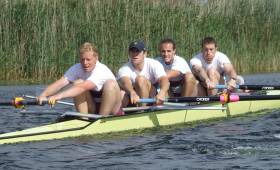Displaying items by tag: Paul Giblin
Deane is First Recipient of Paul Giblin Award
#Rowng: The inaugural Paul Giblin Award has been conferred on Georgina Deane, the captain of NUIG Boat Club.
The award was presented at a reception in Salthill Hotel. Guests included Paul’s
wife Cate, parents Helen and John and extended family. Also in attendance were members of the
rowing community in Galway, Mike Heskin and Kathy Hynes of the NUIG Sports Unit and former
NUIG president, Iognáid (Iggy) Ó Muircheartaigh.
Paul Giblin was one of the most successful oarsman to come from NUIG BC, with 19 national titles, multiple
representations and medals at international level and two medals from the prestigious Henley Royal
Regatta. Paul tragically passed away earlier this year after a long battle with Non-Hodgkin’s
Lymphoma. The award was set up in memory of Paul to support a developing athlete who displays
the same characteristics and potential as Paul did when he first arrived at the club.
The Paul Giblin Award has both financial and ancillary supports. The recipient will receive a bursary of
€2,000 and support service from the NUIG Sports Unit, similar to those offered on the current NUIG
scholarship. In the future the award may be conferred to an exceptional member of NUIGBC or to an
exceptional athlete who intends to enrol at NUIG.
Georgina Deane was deemed to be the most suitable candidate for the award based on her
achievements in her first year in the club. Georgina stared in NUIG BC’s learn to row program in
September 2016. Within two weeks she moved into the competitive programme. From January 2017
she was a key member in all of the top racing crews and by July 2017 she had won national titles
across three different grades. Georgina worked tirelessly on and off the water. She assisted in the
organisation of the logistics for competitions, fund raising events, and the general running of the
club. It was for her athletic ability and potential and for her character and commitment to the club
that she was selected to receive the award.
This bursary would not be possible without the generous contributions of all those who
donated to the Paul Giblin Fund.
Death of Galway Rowing Stalwart Paul Giblin (34)
#Rowing: Paul Giblin, a hugely successful rower with NUIG/Gráinne Mhaol, has died aged just 34. Giblin had dealt with cancer since 2012 and had undergone a bone marrow transplant in 2015.
His rowing career brought him medals at the World Student Games and the World Under-23 Championships, but he will be best known as a powerful member of the remarkable senior eight and senior fours from NUIG/Gráinne Mhaol. He was part of senior eights wins at the Irish Championships in 2002, 2006, 2009 and 2010, and senior coxless fours wins in 2002, 2003, 2004, 2005, 2006, 2007 and 2009 and 2010. In all, Paul Giblin amassed 17 Irish senior championship wins. He won titles racing in all four seats of the coxless four.
He also competed as a cyclist with Galway Bay Cycling club and took part in Rás Tailteann in 2010.
The Galway man, who was a Lieutenant in the Irish Army will be buried on Wednesday after mass at at St Oliver Plunkett Church in Renmore.






























































